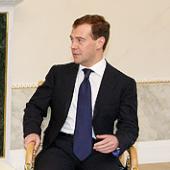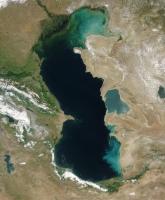At the end of a two-day summit that wound up today, the EU and Russia announced the start of formal negotiations for a longterm strategic cooperation agreement to replace the one signed in 1998. Those who like to read significance into minor trivia might take note of the date: July 4th. The negotiations, which have been previously blocked by Poland and most recently Lithuania, are set to address a wide range of subjects, but prominent among them will be increased economic integration between Russia and the Euro zone. That means everything from visa waivers for travel to the all-important energy […]
Russia Archive
Free Newsletter
This Oxford Business Group article on the potential rebirth of the Russia-Syria strategic relationship (via Friday Lunch Club) illustrates that, while Russia is not yet in a position to project its influence as widely as it did during the Cold War, the Middle East is already well within its reach. It also illustrates the fine line that American policy, both regional and global, will have to walk in the post-Bush era. Whether in terms of values (democracy promotion) or interests (containment/isolation of adversaries), readily available alternatives exist to American influence and support. Sovereign wealth funds, for instance, are increasingly allowing […]
According to RIA Novosti, Russia-China trade rose 44 percent year on year, to $48 billion last year. Not surprisingly, 90 percent of Russian exports to China consisted of energy products and raw materials, while 40 percent of Chinese exports to Russia were engineering or electronic products. Again, in some ways this kind of reinforcement of bilateral ties among strategic rivals represents a threat to America’s interests. But in other, broader ways, it lessens the potential for a conflict between them that could threaten the stability of the global order. With regard to the more specific question of how China’s growing […]

On June 6, Dmitry Medvedev presided over his first major multinational meetings since replacing Vladimir Putin as Russia’s president on May 7. The first gathering involved an “informal” summit of the heads of state of the Moscow-led Commonwealth of Independent States (CIS). The second was the annual meeting of the St. Petersburg International Economic Forum, which attracts many foreign diplomats and business executives. At the meetings, Medvedev eschewed the sarcastic and at times menacing rhetoric of his predecessor. He also seemed slightly more open to resolving Russia’s differences with Georgia. Yet, Medvedev reaffirmed Putin’s hard-line position regarding NATO expansion and […]

America’s preoccupation in the Iraq and Afghanistan wars has significantly undermined its influence in the Asia-Pacific region. Much has been written about how China has attempted to fill the “American void” in the Asia-Pacific and to reconfigure the region’s geopolitical architecture, but little attention is being accorded to Russia’s new power plays in the region, which, if not appropriately understood, will have tremendous consequences for American interests. Over the past five years, Russia has been slowly repositioning itself in the Asia-Pacific through arms sales, participation in regional venues like the Six-Party Talks concerning North Korea’s nuclear program, and energy exports. […]

Although he is no longer Russia’s president, Vladimir Putin led the high-level Russian delegation that visited France beginning May 29. During his first visit outside the former Soviet bloc since becoming prime minister last month, Putin held talks with his counterpart, French Prime Minister Francois Fillon, but also engaged in substantive discussions with French President Nicolas Sarkozy and his predecessor, Jacques Chirac. Putin’s change of office has not apparently led him to change his views. He dismissed Western complaints about Russia’s human rights policies as political propaganda, claimed Russia could do little to arrest surging world oil prices, and warned […]
Russia may become a player in North American energy markets sooner than anyone expected. According to the June 7 edition of the International Herald Tribune: Gazprom has made a proposal to BP PLC and ConocoPhillips, which in April submitted a bid to build a multibillion-dollar pipeline that would carry natural gas from Alaska’s North Slope to the lower 48 U.S. states, Gazprom director Alexei Miller said.”Gazprom has unique experience, knowledge and modern technology and is the most advanced company in the world in the realm of gas transport in trunk pipelines,” Miller told an international business forum in St. Petersburg, […]
Some reflections on the future of Russia-EU relations from Nikolas Gvosdev. As Gvosdev notes, France has been a strong advocate for harmonizing this relationship, but the attitude here among strategic thinkers seems to be that Russia is unlikely to be more than an important but occasional tactical partner for the near future. Neither friend nor enemy, a partner at times, and a problem at others. Of course, the Partnership and Cooperation Agreement, depending on what it institutionalizes, could change that. But I get the feeling that the French view of Russia is more lukewarm than the official diplomatic posture might […]

The recent improvement in relations between Azerbaijan and Turkmenistan could help remove a major obstacle to the exploitation of Caspian Sea energy reserves. When Gurbanguly Berdymukhammedov arrived in Baku on May 19, he became the first Turkmen president in over a decade to visit Azerbaijan. The two countries severed ties in 1999 over an Azerbaijani decision to develop an oil and natural gas field that the Turkmenistan government also claimed. Until now, the unresolved dispute among the five Caspian states over how best to divide and manage the sea and its valuable subsurface natural resources has impeded efforts to exploit […]
Nikolas Gvosdev kvetches about Congress taking aim at the Indian and Russian 123 Nuclear Agreements. My understanding is that the Russian deal does a good job of cementing bilateral cooperation in an area where we have a vested interested in them not operating as a loose cannon. The Indian deal, meanwhile, presents some valid proliferation concerns due to India’s non-NPT status. But either way, the Congressional interference, which as Gvosdev notes, is based on unrelated policy issues, illustrates the need for some sort of strategic framework between the Executive and Congress on nuclear agreements. This is a sector that by […]
